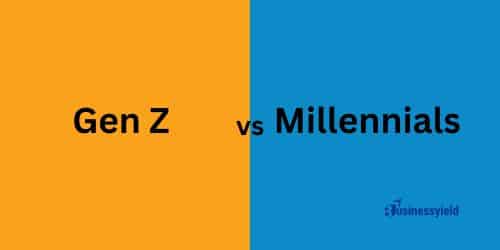Understanding the difference between millennials and Gen Z is important when targeting young adults with your products or services. Although both of these generations have been exposed to technology and the internet from a young age, they tend to have different preferences when it comes to purchasing and spending, as well as their reactions to marketing tactics. Gaining a clear understanding of the different characteristics of these two generations can greatly enhance your ability to effectively reach out to them. With extensive experience in understanding and navigating generational shifts, I am thrilled to provide you with valuable insights and effective strategies to establish a stronger connection with your target audience.
Key Takeaways
- Gen Z, also known as Generation Z, born approximately between the mid-1990s and early 2010s, is characterized by being digital natives, having grown up in a world heavily influenced by technology, social media, and instant access to information.
- Millennials, also known as Generation Y, born between the early 1980s and mid-1990s, came of age during the turn of the millennium, witnessing the rise of the internet, social media, and globalization.
- Gen Z excels in digital engagement, while Millennials have a mix of digital and traditional preferences.
- Both generations highly value authenticity and transparency from brands, although their understanding and expression of authenticity may vary.
- Brands that resonate with Gen Z and Millennials are those that share their values and actively support social and environmental causes.
- Influencer marketing has a strong influence on both generations, although the specific types of influencers they trust and interact with may differ.
- Gen Z prefers concise and visually captivating content, while Millennials value detailed information and engaging narratives.
Gen Z vs Millennials: Generational Characteristics
Let’s start by understanding what motivates Gen Z and Millennials. Gen Z members, who were born between the middle of the 1990s and the beginning of the 2010s, have grown up in a society where social media and smartphones are ubiquitous. Contrastingly, Millennials, born approximately between 1981 and 1996, came of age during the internet’s ascent to prominence.
I have a vivid memory of the excitement that came with receiving my first smartphone as a millennial. It felt like I had a hold on the future, which is a stark contrast to the childhood memories of many Gen Zers who can’t remember a time before smartphones were everywhere.
Perception of email marketing
Both Millennials and Gen Z share similar views on email marketing. Both groups appreciate marketing emails that offer a clear benefit or provide valuable information. They also appreciate emails that are engaging and enjoyable. In addition, it’s worth noting that Gen Z tends to check their emails less frequently compared to millennials.
Drawing from extensive email marketing campaigns targeted at both demographics, I’ve observed the nuanced differences in engagement metrics and response rates. Tailoring email content to resonate with each generation’s preferences is essential for maximizing campaign effectiveness.
Read Also: Email Marketing Platforms: Overview, Common Features, Comparisons
Gen Z vs Millennials: Significant Differences
Shopping Habits

Shopping preferences vary between Gen Z and Millennials. Convenience and instant gratification are top priorities for Gen Z, leading them to frequently choose online purchases and same-day delivery. Contrasting with other generations, millennials prioritize experiences and tend to gravitate toward one-of-a-kind, independent shops and handcrafted goods.
During a recent focus group I conducted, I was truly impressed by how much weight Gen Z participants placed on online reviews and the influence of social media when it came to their purchasing choices. I was truly impressed by the impact of online recommendations on their decision-making process. This is lacking for millennials.
Digital Engagement
It’s evident that both generations are heavily engaged with their screens, but their digital behaviors vary greatly. Visual platforms like Instagram and TikTok have become popular among Gen Z, who seek authenticity and relatability from brands. In contrast, millennials tend to gravitate towards content on Facebook and YouTube, looking for a mix of entertainment and educational value.
As part of our recent marketing campaign aimed at Millennials, we decided to try out storytelling videos on Facebook. Because of how moving the brand’s compelling story was, the response was overwhelmingly positive.
Read Also: Digital Marketing Strategy: The Ultimate 2024 Digital Marketing Playbook
Building Brand Loyalty
For both Gen Z and Millennials, authenticity plays a crucial role in building brand loyalty. Brands that resonate with Gen Z are those that share their values and show a commitment to social responsibility. On the other hand, millennials value transparency and consistency in the brands they support. Establishing a strong foundation of trust requires dedication and perseverance, but the rewards of cultivating a loyal customer base are truly invaluable.
As a brand strategist, I’ve collaborated with companies to develop purpose-driven initiatives that resonate with Gen Z and Millennials. By aligning brand values with societal causes, businesses can cultivate a loyal customer base and drive positive social impact.
Read Also: Incorporating Mission Statements into Branding: A Comprehensive Guide for Businesses
The Influence of Influencers
When it comes to making purchasing decisions, influencers’ opinions have a big impact on both generations. Micro-influencers who align with Gen Z’s specific interests and values are more likely to gain their trust, while Millennials tend to be attracted to influencers who offer detailed reviews and recommendations.
Value Alignment: Going Beyond Profit
Gen Z and Millennials consider more than just product features and price tags when making purchasing decisions. They are drawn to brands that align with their values and actively support social and environmental causes. Companies that show a sincere dedication to making a positive difference earn the loyalty and support of their customers.
Tailoring Communication
Clear and compelling communication is essential for driving successful marketing and sales initiatives. While Millennials value in-depth information and storytelling that connects on a personal level, Gen Z prefers concise, visually appealing content that captures immediate interest.
Our sales team experienced a significant boost in performance by creating email campaigns that were tailored specifically to Millennial customers. Through crafting our messaging to directly address their unique concerns and preferences, we observed a notable surge in the number of people opening our communications and the rate at which they converted into customers.
Anticipation for creativity
Although millennials and Gen Z share the belief that companies should offer innovative products and services to cater to customer needs, Gen Z has even higher expectations when it comes to innovation. Their viewpoint probably stems from being raised in an era of rapid technological advancements.
Spending Habits
Generation Z exhibits more prudent spending habits and a greater emphasis on saving money compared to millennials at a similar stage in life. Members of Gen Z are often drawn to purchases that offer the greatest value for their money, while millennials prioritize the overall buying experience. Because of this, they are attracted to bonus offers, generous deals, and high-quality investments.
Mobile purchasing habits
Although millennials tend to prefer online shopping, Gen Zs show a greater inclination toward making purchases through mobile devices. Millennials have experienced the evolution of technology, from the era of bulky personal computers to the advent of compact cell phones and the introduction of dial-up internet. The younger generation, known as Gen Z, has been raised in a world where smartphones, tablets, and instant access to Wi-Fi and streaming services are the norm. Gen Z is more inclined to use mobile devices for making purchases, given their familiarity with technology from an early age.
It’s worth noting that both generations rely on their mobile devices for internet browsing and video streaming. If your target audience consists of young adults, it would be beneficial to prioritize creating a positive and engaging experience through mobile videos and e-commerce sites. Consider directing your marketing efforts towards mobile platforms, such as social media apps.
Read Also: MOBILE MARKETING: Definition, Example & All You Need To Know
Gen Z vs Millennials Consumer Behavior: Implications for Marketers and Sales Representatives
After thoroughly examining the intricate variations in consumer behavior between Gen Z and Millennials, it is now important to condense our discoveries into practical insights that will enable marketers and sales representatives to establish significant connections and achieve impactful outcomes.
Highlighting Key Points
Upon analyzing the shopping habits, digital engagement patterns, brand loyalty drivers, and communication preferences of both generations, we can pick out the following points:
- Digital Dominance: Gen Z excels in digital engagement, while Millennials have a mix of digital and traditional preferences.
- Emphasizing Authenticity: Both generations highly value authenticity and transparency from brands, although their understanding and expression of authenticity may vary.
- Brands that resonate with Gen Z and Millennials are those that share their values and actively support social and environmental causes.
- Impact of Influencers: Influencer marketing has a strong influence on both generations, although the specific types of influencers they trust and interact with may differ.
- Communication Preferences: Gen Z prefers concise and visually captivating content, while Millennials value detailed information and engaging narratives.
Practical Suggestions
Equipped with these valuable insights, let’s discuss how you can implement them and customize your strategies and campaigns effectively:
#1. Create Authentic Brand Stories
During my brainstorming session for a brand campaign, I came across a story from our founder’s journey that beautifully captured our brand’s mission. Our audience’s response was incredible as if they truly connected with our story on a personal level. This authentic story is what you should aim at for your brand. Share compelling stories that resonate with the core values and aspirations of both generations.
#2. Collaborate with Influencers
Consider influencers as your brand’s savvy older siblings—the ones who effortlessly grasp the essence of Gen Z and Millennials. Collaborate with influencers who deeply understand their style, and work together on content that is authentic and compelling.
Read Also: INFLUENCER MARKETING: Meaning, Examples, Strategy & Agency
#3. Customize Communication Channels
Picture yourself having a conversation with a close friend. You naturally adjust your tone and manner to suit the person you are speaking with, don’t you? Give your communication channels the same level of attention and care. Explore interactive content for Gen Z and embrace heartfelt storytelling for Millennials.
#4. Embrace Purpose-Driven Marketing
Highlighting your brand’s dedication to creating a positive impact is like proudly proclaiming, “We are here to make a difference in the world!” Highlight the impactful efforts your brand makes to support causes that resonate with Gen Z and Millennials.
#5. Enhance Digital Engagement
Imagine your brand as the center of attention on social media—the one that everyone is excited to engage with. Invest in platforms that attract Gen Z and Millennials, and create engaging experiences that encourage them to stay.
#6. Encourage the use of content created by users
Invite individuals to openly share their unique stories and experiences, and witness a remarkable increase in trust and credibility.
Witnessing our customers proudly share their photos and testimonials on social media evoked a sense of being part of a greater community, beyond being just a brand. It highlighted the importance of being genuine and forming meaningful connections to cultivate a dedicated community.
Implementing these suggestions will not only help you connect with both Gen Z and Millennials but also establish long-lasting relationships with your audience. Keep in mind that having a deep understanding and showing empathy are crucial for achieving success in today’s constantly changing marketplace.
Here’s a complete checklist for creating a unique marketing campaign:
What Is the Biggest Difference Between Gen Z and Millenials?
The biggest difference between Millennials and Gen Z is their relationship with technology: Millennials grew up alongside the rise of the internet, while Gen Zs are true digital natives, having been immersed in technology from birth.
What is Gen Z Called Now?
Gen Z, born between the mid-1990s and early 2010s, is often called “Zoomers” or “Generation Z” in popular culture and academic discourse.
Why Do Millenials Look Younger?
Millennials appear younger due to lifestyle choices, such as prioritizing health, fitness, and skincare, along with advancements in technology and access to information on wellness practices.
What Are The 7 Generations?
The 7 generations are as follows:
- Greatest Generation (1901-1924)
- Silent Generation (1925-1945)
- Baby Boomers (1946-1964)
- Generation X (1965–1980)
- Millennials (1981-1996)
- Generation Z (1997-2012)
- Generation Alpha (2013–2025)
Gen Z vs Millennials: Final Thoughts
As we conclude our examination of consumer behavior on Gen Z vs Millennials, it’s important to keep in mind that each generation has its distinct characteristics, yet they are connected by common values and aspirations. By truly understanding what your audience wants, being genuine, and tailoring your approach, you can build strong relationships that go beyond age groups and lead to success for your brand.
- EBAY LOGO: Meaning, Font, and History
- Amazon Logo: What Makes the Logo Special? All You Need
- Save Money Live Better: 15+ Best Easy Hacks for Millennials in 2023
- AMAZON PRIME LOGO: History, Fronts, and All You Need to Know






